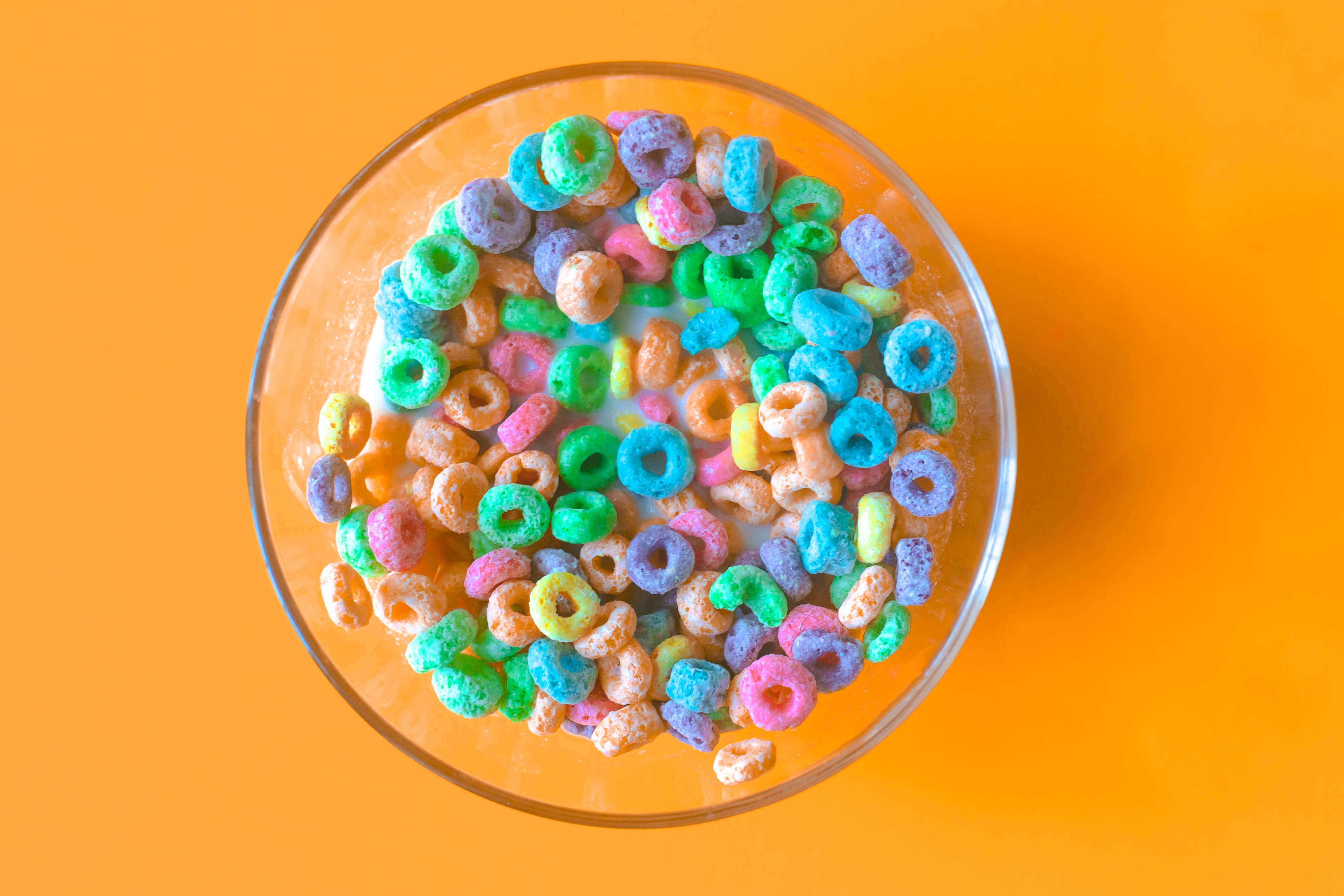How Many Grams Of Sugar Is It Actually Safe To Eat Per Week?
Okay, okay, we get it: Eating a pint of Ben and Jerry’s every night while watching Friends for the upteenth time is maybe not the healthiest thing in the world (even if it does feel so right). But the never-ending talk of how bad sugar is and the futile attempts to cut it completely out of our lives often only lead to confusion and frustration because sugar, it seems, is in almost everything. So since that’s probably not happening, how many grams of sugar should you actually have per day?
Even without the traditional M&M’s or Red Vines at the movie theater or your favorite melt-in-your-mouth chocolate-chip cookies, there are many unexpected sources of sugar out there—we’re talking to you, bread—that are a lot trickier to deal with.
“At the end of the day, sugar is sugar, and our bodies will process sugar all the same whether it’s organic honey or regular table sugar,” explains Danielle Stark, a registered dietician and Wellory Nutrition Coach. “However, that being said, there are some sugars that are harder for our bodies to digest and can have a larger impact on our overall health, such as high-fructose corn syrup and sucrose.” High-fructose corn syrup can be usually found in your typical junk foods, like soda and frozen pizzas, while sucrose, also known as table sugar, is usually linked to certain high-sugar fruits like dates, and foods that have been sweetened, like yogurt. These types of added sugars, she explains, are more easily absorbed in the body and when eaten, can lead to obesity, high blood pressure, insulin resistance, and type II diabetes.
The naturally-occurring sugars found in fruit, on the other hand, come alongside fiber, antioxidants, vitamins, and minerals, and are an important part of our diets, which means cutting out sugar entirely is not only difficult, but is also not the healthy move it may seem.

Instead, it’s crucial that we differentiate between the good sugars and the bad ones in order to make the smartest nutritional decisions. “Cutting out any major food group can feel very restrictive for many,” Stark says. “So, the best practice is to limit as much added sugar in our daily diets as possible.”
Okay: How much sugar can you eat every day?
According to the American Heart Association, American adults consume an average of 77 grams of sugar per day, which adds up to a shocking 60 pounds annually. It’s obvious that this is too much, but the thing is—there’s actually no official recommended daily sugar intake.
There are, however, recommended limits on how much added sugar you should eat in a day, but even those vary. The FDA suggests that no more than 10 percent of your day’s calories should come from added sugar. So, if you’re eating a 2000-calorie diet that works out to about 50 grams (12 teaspoons) of sugar daily, or 364 grams (84 teaspoons) of sugar in one week.
Other organizations are even more conservative with their added sugar recommendations. Both the American Heart Association (AHA) and the World Health Organization (WHO) both suggest about 25 grams (six teaspoons) per day of added sugar for women, or 175 grams of sugar (42 teaspoons) per week.
What A Day’s Worth Of Added Sugar Really Looks Like




Wait…what’s the difference between added sugars and natural sugars?
To be clear: Added sugars are when processed (like white granulated sugar) or naturally-occurring sugars (like honey or fruit juice) are dumped into foods to make them sweeter, says Karen Ansel, R.D., author of Healing Superfoods for Anti-Aging. Added sugars are most commonly found in packaged foods like cookies and candy bars, but you’re technically using added sugar whenever you put organic honey on top of your yogurt, or bake with maple syrup.
Nutritionists and health experts aren’t as concerned about the sugar naturally present in whole foods like fruits, veggies, dairy, and whole grains. They have limited amounts of sugar (most fruits, for example, have only 15 grams per serving), and come with other nutritional benefits (like fiber and vitamins) that foods with added or processed sugars generally lack. “It’s always better to eat a whole apple than to drink a glass of apple juice,” says Brigitte Zeitlin, R.D.
And yes, all sugars (no matter the source) generally affect your bod in the same way, says Ansel—they get broken down into energy for your muscles, organs, and brain. But foods with loads of added sugar (like that soda) are broken down by your body very quickly, making your blood sugar levels spike and then drop very, very rapidly.
What happens when you eat too much added sugar?
In the short-term, the side effects of too much sugar include trouble concentrating and mood swings due to sudden drops in blood sugar. Too much sugar (specifically in foods high on the glycemic index) has also been linked to acne breakouts and premature wrinkles. (So…it’s literally doing you zero favors.)
Over the long term, regularly spiking your blood sugar with a diet of super-processed, sugary foods can lead to inflammation throughout your body and weight gain, and may even up your odds of other chronic illnesses like heart disease and diabetes.
“No one is gaining too much weight because of the sugar in milk,” says Ansel. “The same thing goes for whole fruit. The problem is with foods that are high in added sugars.”
How do I watch my added sugar?
That’s a little tricky. Historically speaking, most food labels showed just the sugar content per serving, lumping all sources of sugar into one category, but the FDA recently changed their food-labeling guidelines to better highlight added sugars. “This change makes it easier for the consumer to make educated food choices,” Stark notes. So with that being said…
Read nutrition labels fully, and swap foods accordingly.
“Don’t be confused by added versus total sugars,” Stark warns. “And if you’re unsure, you can look at the ingredient list to identify what type of sugar is being used within the product.” When it comes to curbing your added sugar intake, Stark suggests paying close attention to where they’re coming from in your diet. “Are they in your nut butters? Condiments? Tomato sauces? Yogurts? Fruit juices?” Stark poses. “From there, try to make some healthier swaps to options with little to no added sugar.”
Sugar isn’t totally off limits, but practice moderation.
In taking a holistic look at what you’re eating, you can decide what’s worth the added sugar and what’s really not. The birthday cake you fantasize about all year long, for example, might be well worth using all of your sugar allowances for the day, but drinking a soda with half your daily allotment of added sugar may be harder to justify. It’s these kinds of judgement calls that can help you cut out some unnecessary foods and drinks and prioritize what you care about most.

But no matter how much you try, we know there are some sugary indulgences that you simply can’t quit (after all, who would want to sacrifice brownies for the rest of time?). So, with these non-negotiables, try your best to practice moderation. Rather than eating an entire bar of chocolate every day, opt for just a square or two.
Try to get most of your sugar from whole foods.
Focusing on whole foods will make a big difference in your ability to limit added sugar. The more sugar you consume, the more resistant you become to the sweetness of that food, Stark explains. So there’s a chance that chocolate bar won’t taste as good to a person who consumes lots of sugar as it does to someone who has sugar only moderately.
If you focus more on getting your sugar from whole foods, you can almost train your body to better appreciate the sweetened profile of a dish or treat. So basically, you can trick your body into fulfilling its sugar cravings with less.
Check in with your doctor for further advice.
Of course, if you deal with specific issues, like diabetes, or have trouble with weight management, it’s always a good idea to have an open dialogue with your doctor. Check in with them about your sugar intake and discuss what makes the most sense for you because at the end of the day, our bodies are all different, and they should be treated accordingly.
The bottom line: All sugars affect your body in a similar way, but sugars from whole foods tend to come with other good-for-you nutrients, like vitamins. So focus more on limiting your added sugars, and don’t stress too much about natural sugars, like those found in fruit.
Source: Read Full Article



